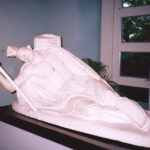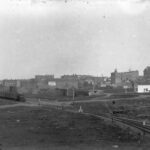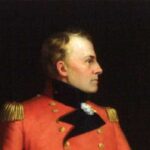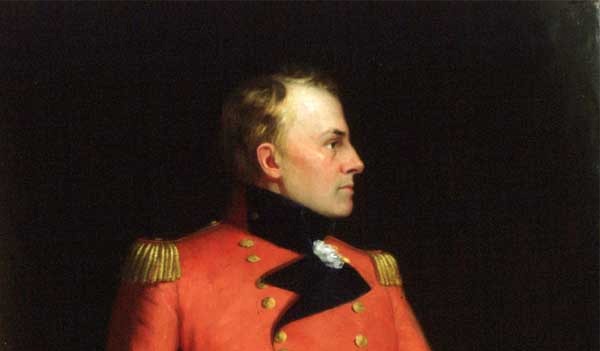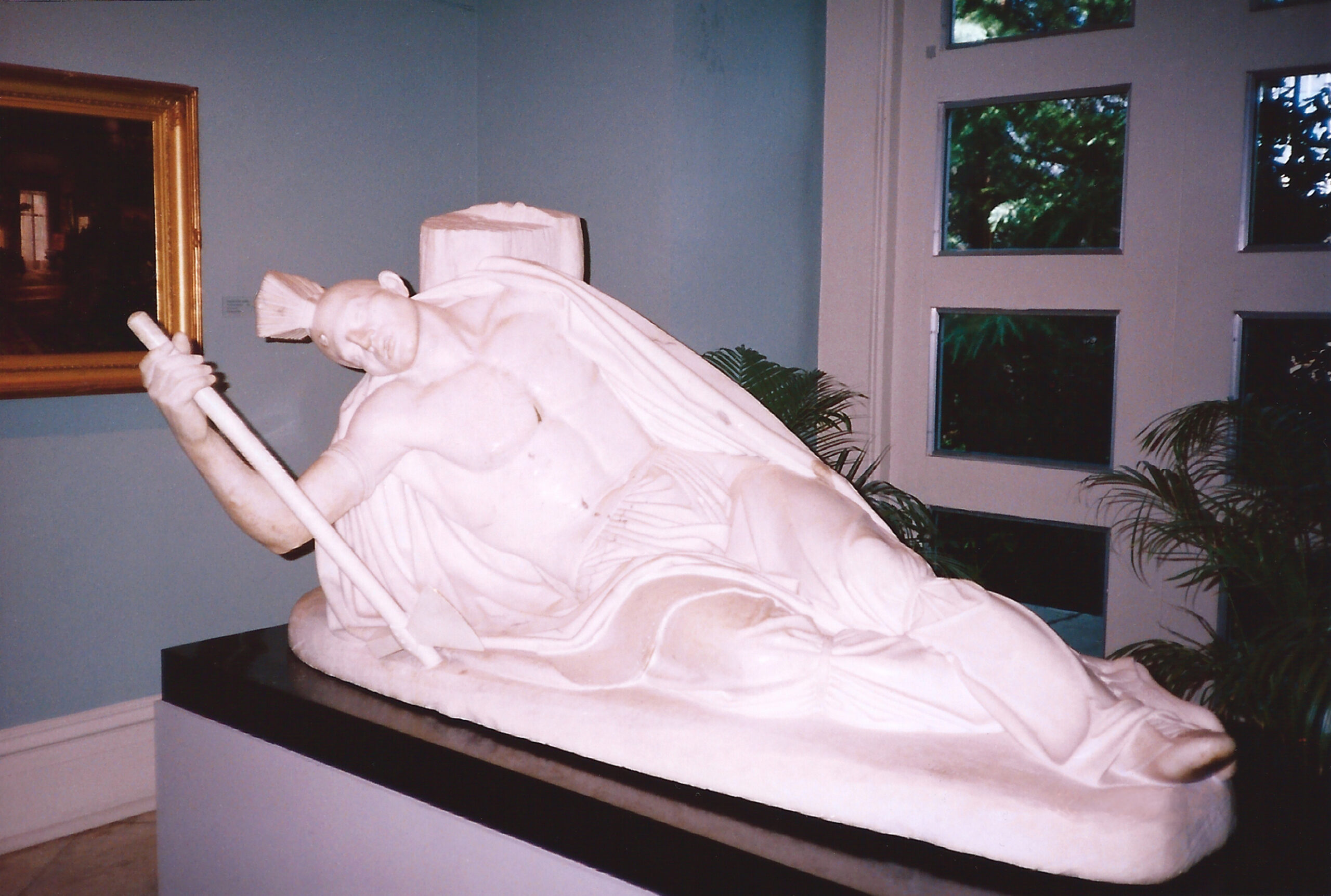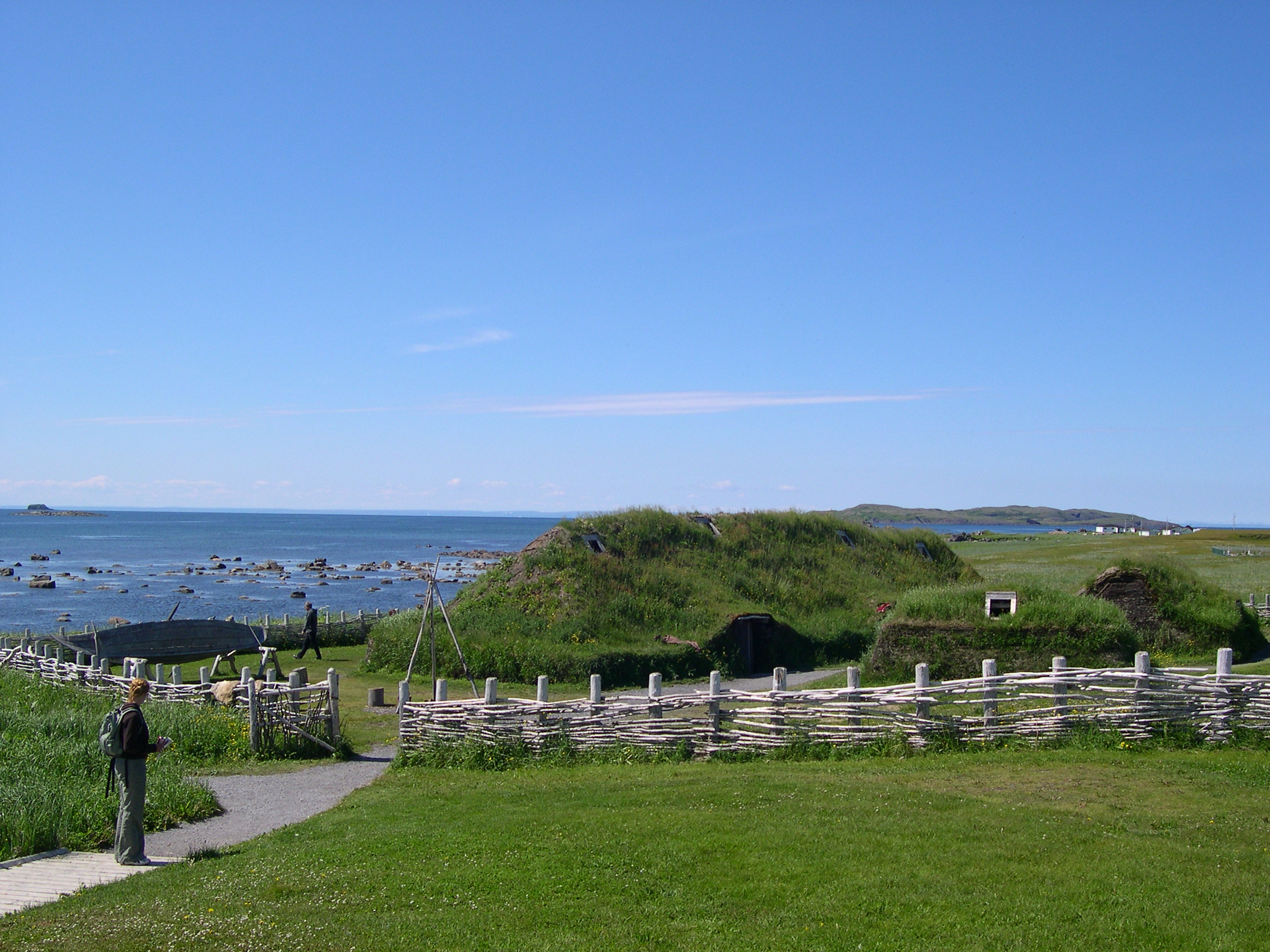By William Hardwick
June 1812: The Edge of Empire
By the time war was declared in June of 1812, the vast, wooded sprawl known as British North America was less a nation than a patchwork of loyalties sewn into the fringes of a crumbling empire. It was a territory claimed more by imperial ink than by military might, a shadow realm stretching from the icy Atlantic to the Great Lakes, sustained by fragile alliances and the flickering memory of British authority. In truth, Canada did not yet exist — not as a sovereign state, not even as a coherent idea. It was a cultural frontier, where French habitant, English settler, Scottish trader, and Indigenous warrior lived in wary proximity, united not by law, but by the shared geography of survival.
There was no Ottawa. No federal Parliament. No national anthem to sing over battlements. No maple leaf flag to wave in defiance. The only banners fluttering above the fields of Queenston or the ramparts of Fort George were the Union Jack and the raw red of British military regiments — frayed from weather, salt, and war.
What held the place together was not an organized defense, but a fragile chain of frontier towns and outposts — some no more than log stockades, others isolated stone forts facing the wooded banks of American territory. Along the Niagara, Detroit, and St. Lawrence frontiers, thin lines of British regulars stood as sentinels, their ranks filled with hardened veterans of Europe’s wars and colonial garrisons. They were supplemented, where possible, by scattered militia regiments — part-time soldiers drawn from farms and fur posts, fighting with more spirit than skill.
And yet it would be this paltry force — under-supplied, under-trained, and outnumbered — that would be asked to withstand the full force of the United States Army, which believed it could conquer Canada before breakfast.
“Canada was not prepared for war,” writes historian Pierre Berton, “but neither was it prepared to surrender.”1
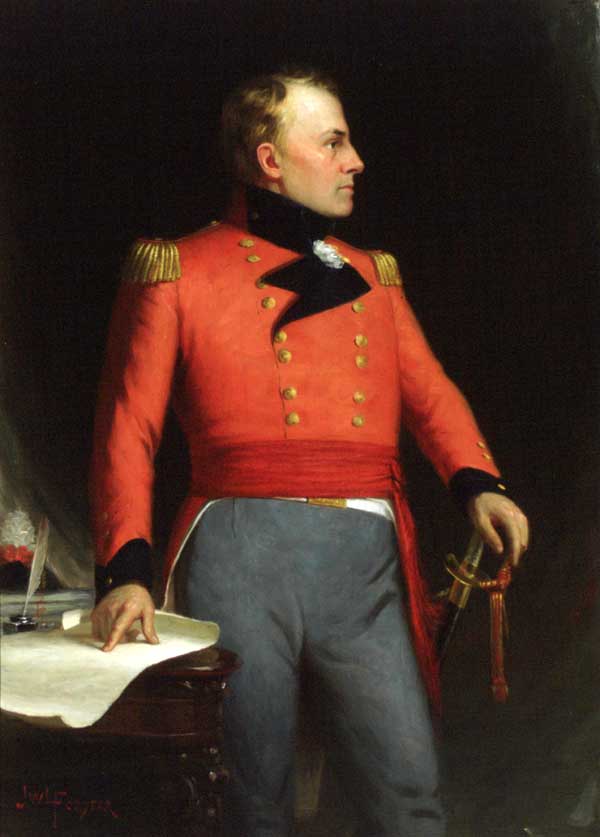
Amid this volatile landscape, one figure stood apart: Major-General Isaac Brock. His name would not have meant much in London at the time — just another colonial officer assigned to the margins. But to those who knew him, Brock was a man possessed of uncommon energy and instinct. He stood tall — six-foot-two — a commanding presence in a red coat, with steel-gray eyes and a face “burned by sun, lined by fatigue, and unbowed by defeat,” as one subordinate later wrote. In an army of cautious bureaucrats and imperial idlers, Brock was a rare creature: a man of action, of vision, and of foreboding.
Brock was not born to the colonies he would later defend. Nor, strictly speaking, was he born in Britain. He entered the world in Guernsey, a wind-lashed Channel Island loyal to the Crown but sitting just off the coast of France. The island’s culture — maritime, martial, and multilingual — instilled in him from an early age a sense of both imperial duty and existential threat. The sea was never far; nor was war.
Like many sons of respectable but land-poor families, Isaac Brock’s career began not with inheritance, but with a purchased army commission, bought at the age of fifteen. His education was both classical and practical. In his youth, he studied Latin, geometry, and swordsmanship; by adulthood, he was a soldier-scholar, equally comfortable reading Caesar’s commentaries or commanding artillery under fire. He admired the discipline of the Romans, and carried with him a deep sense of historical purpose — the belief that some men are called not to comfort, but to confrontation.
“He was a soldier of empire,” historian Carl Benn observes, “but a patriot in spirit.”2
Over the next three decades, Brock served the empire from the fetid swamps of the Caribbean to the battle-scarred fields of Holland. He faced more danger from disease than musket shot, enduring repeated outbreaks of yellow fever that claimed thousands of his fellow officers. In one posting, he was reportedly so ill that his survival was considered a minor miracle. Yet he emerged from each ordeal leaner, harder, and more focused. His worldview was shaped not by abstract politics, but by the visceral reality of life on the edge: garrisons with spoiled rations, men dying from tropical illness, sentries who fell asleep at their posts.
It was in these grim outposts of empire that Brock forged the habits that would define him. He rose before dawn, inspected barracks personally, and drilled his men until they could load and fire by reflex. He spent long nights reviewing maps by candlelight, sending letters to supply officers, and proposing reforms to a War Office that rarely replied. Promotions came slowly. Recognition came late. But Brock endured. Not for glory, but because he understood — perhaps more clearly than anyone — that discipline is what remains when hope is gone.
When he arrived in Upper Canada in 1802, he found a colony that others regarded as a backwater. But he did not see it that way. He saw instead a land unprepared for war but destined to fight one. The border with the United States stretched over a thousand miles, much of it poorly defended. British regulars were few, militia poorly organized, and the colonial government burdened by indifference in London and division at home. And yet Brock, almost alone among his contemporaries, did not despair. Instead, he prepared.
Tim Cook, in his essay on early Canadian military leadership, writes:
“Brock possessed an almost prophetic sense of timing. He trained militias before they were needed, built fortifications before a single shot was fired, and cultivated alliances long before others saw the value.”3
Indeed, Brock’s greatest gift may have been his instinct for urgency. Long before the war came, he was drilling militias near York (modern-day Toronto), stockpiling supplies at Fort George, and strengthening garrisons at Amherstburg and Niagara. He maintained correspondence with Indigenous leaders, most notably Tecumseh, with whom he would later form the most critical alliance of the war. He ignored the common wisdom that the colony was unimportant and instead treated every outpost, every regiment, every captain’s report, as if it might tip the balance of history.
“Preparation,” Brock once wrote, “is not the enemy of bravery. It is the foundation of it.”
In the eyes of his men, he was relentless. He expected the same of them. In an age when many British officers viewed colonial service as semi-retirement, Brock stood like a stone wall against complacency. Even his critics acknowledged his resolve. He was known to dress down junior officers for lapses in vigilance and would personally inspect sentry posts, even in torrential rain.
He was, as Pierre Berton put it, “a man who seemed to know that his moment was coming, and who lived every day as if it might be the eve of war.”1
And in June of 1812, that moment finally came.
The Mind of a Commander
Unlike many of his contemporaries — men adorned in braid and epaulettes, more suited to salons than to sentry posts — Isaac Brock was neither a parade-ground peacock nor a blood-stained butcher. His authority did not come from aristocratic lineage, nor from battlefield bravado alone. It emerged from something quieter and far more rare in the officer corps of his age: a disciplined, reflective, and deeply strategic mind.
While the British Army of the Napoleonic era was still heavily shaped by purchase and pedigree, where many officers treated reading as affectation and strategy as guesswork, Brock approached his profession with the rigor of a scholar-general. His modest garrisons often lacked paper and books, yet he still found ways to surround himself with intellectual ammunition. His tent or quarters — whether in Gibraltar, the West Indies, or the wilds of Upper Canada — often contained weathered volumes of Plutarch, Livy, Xenophon, and Machiavelli. He read the Parallel Lives not for entertainment, but to absorb the leadership lessons of antiquity. Caesar’s campaigns, he once noted, were not merely military histories but manuals for political will under duress.
“Success,” Brock wrote in one of his rare surviving letters, “is often born of daring, but sustained by discipline.”1 It was a phrase that captured his ethos: courage as the spark, but control as the fire that must be kept burning.
There was in Brock a kind of self-fashioned Roman austerity, a rejection of the frivolities common among British officers abroad — no gambling in the mess, no mistresses in his barracks, no softening into colonial luxury. As historian Tim Cook would later describe him, Brock was “a martial Stoic — a man who saw hardship not as misfortune, but as preparation.”2
He did not dwell on fate, yet he moved with the posture of a man expecting to be tested by it. In an army often filled with what Wellington once called “the scum of the earth,” Brock stood apart as a professional in both thought and action. His loyalty to duty was not performative — it was anatomical.
When he was posted to Upper Canada in 1802, Brock was already a seasoned officer, hardened by tropical disease and continental warfare. To many, the assignment was a dead end — a sleepy province on the edge of the empire, whose population was small and whose strategic value was doubted in London. The post offered no promise of promotion, no opportunity for glory. But Brock, unlike many who treated the colonies as a place to wait for retirement, saw warning signs in the silence.
The borderlands were fragile. The Niagara frontier was, in effect, a shallow line of timber and earthworks, a few forts squatting on the edge of a vast continent. The local militias were loosely organized and ill-equipped. Political tensions in the United States were rising. The War Office, blissfully unaware, debated budget cuts in Whitehall parlors while Brock stared across the river at a republic growing hungrier and more confident by the day.
“While Whitehall dithered,” Pierre Berton would later observe, “Brock built a nation’s defense with a carpenter’s tools and a general’s foresight.”3
And that’s precisely what he did. Like a craftsman working without blueprints, Brock set about strengthening the spine of the colony — not with sweeping gestures, but with tireless routine. He personally inspected every fort from Fort Erie to Amherstburg, cataloguing powder magazines, mapping approach routes, and assessing whether earthworks could withstand bombardment. He wrote dozens of reports — many of them ignored — requesting artillery, reinforcements, and boots. Where supplies did not exist, he improvised. Where plans were missing, he made his own.
He reorganized the local militias, training them with whatever weapons were on hand, and instilled in them a form of civic-military pride. He emphasized discipline, marksmanship, and the value of rapid mobilization. In a colony where drills were sometimes viewed as empty ritual, Brock made them matter. And he didn’t simply command from a distance. He watched. He taught. He marched beside them.
His energy was, as contemporaries recalled, near-manic. Aide-de-camps found themselves exhausted by his pace. One junior officer wrote:
“He inspected tents at sunrise, marched troops by noon, wrote dispatches by dusk, and still found time to read Caesar before midnight.”
This was not romantic zealotry. It was the methodical building of a defense he knew might one day be the only barrier between empire and erasure.
His belief in readiness was not borne of anxiety but of realism. Where others saw peace, Brock saw only a lull — a breathing space before the next war. His foresight was not paranoid; it was prophetic.
Brock’s preparations along the Niagara frontier were not dramatic in isolation — a trench dug here, a gun emplacement moved there — but cumulatively, they created a defensive network that would later frustrate and repel superior American forces. He ordered roads widened for troop movement. He ensured boats were constructed to ferry men across critical points. He tracked inventories with a clerk’s precision and a general’s urgency.
Meanwhile, across the Atlantic, the War Office in London continued to treat Canada as an unprofitable afterthought. Its officials believed that should conflict come, the Americans would be quickly pushed back by British naval supremacy and perhaps a few symbolic victories. Reinforcements were delayed, supplies were rationed, and dispatches arrived late or not at all.
Brock, increasingly aware that he stood alone, grew more urgent.
“The colony is not prepared for war,” he wrote in 1811, “yet war will surely come. I have neither the means nor the manpower — but still, I must act.”
In the crucible of isolation, Brock’s strategic mind and relentless discipline became his greatest weapons. While others awaited instructions from London, he created contingency plans. While politicians debated the cost of sabres, Brock trained men to fight with whatever they had — and to believe, as he did, that resolve could compensate for numbers.
And when war did come, just as he predicted, Brock’s years of meticulous preparation turned what should have been a devastating American conquest into the opening chapter of one of the greatest defenses in colonial history.
Whisper of War
By 1811, the possibility of war between Britain and the United States was no longer the stuff of diplomatic rumor or political posturing. It was a slow-burning fuse, visible to anyone with the foresight — or the nerve — to trace its path. The Atlantic, once a boundary, had become a pressure valve, hissing with tension. On both sides of the ocean, grievances piled like kindling: economic sanctions, naval blockades, and a persistent clash of sovereign ambitions. But the real fire was building not in the chancelleries of Europe, but in the raw fields and forests of North America.
To the average American citizen, war was overdue. British warships still prowled the coasts, boarding American merchant vessels and dragging away sailors under the pretext of “impressment” — often with no more proof than a name or an accent. These acts were seen as violations of national honor, and they stirred fury across the United States. Newspapers from Boston to Charleston published lists of names — Americans, it was claimed, who now labored in the belly of the Royal Navy. Each name added another drop of gasoline to the fire.
But if maritime grievances kindled the flame, it was land hunger that fanned it. The young American republic, barely thirty years removed from its own revolution, had turned its gaze northward and westward — toward the Ohio Valley, the Great Lakes, and the lands held by Indigenous nations and British settlers. To many American politicians, these regions were not foreign soil, but unfinished business.
In the halls of Congress, a new generation of fiery orators took control. They were called the War Hawks — not mockingly, but with something close to reverence. Young, ambitious, and utterly convinced of their republic’s destiny, men like Henry Clay of Kentucky and John C. Calhoun of South Carolina insisted that British Canada was vulnerable, sparsely populated, and lightly defended. To them, it was ripe for the taking.
“Canada is but a march away,” Clay famously proclaimed, imagining a quick, glorious invasion in which American forces would be welcomed as liberators by the Canadians themselves.
This was not strategic assessment. It was ideological arrogance. But it was powerful, and it was contagious. The belief that Canada would fall with little resistance gained momentum in Washington, especially as Britain’s military attention remained fixed on Napoleon and the war in Europe. American expansionists believed that Britain could not — and would not — afford to defend a few remote provinces across the ocean.
They were wrong. And Isaac Brock knew it.
In Upper Canada, Brock had been watching the storm gather for years. While London traded in diplomacy, and Washington trafficked in political fantasies, Brock had spent the better part of a decade reading the land — and the men who might one day fight for it. He knew that Canada, while geographically vast, was militarily exposed. The colony’s population was dwarfed by that of the United States. Its defense infrastructure was thin, and its militias were unevenly trained. But Brock also knew something the War Hawks did not: that in the minds of many settlers, particularly Loyalists and Indigenous allies, there remained a core of resolve — and in war, resolve often proves more decisive than numbers.
“I do not deceive myself,” Brock confided in a letter to a fellow officer in early 1812. “We are ill-prepared for a conflict of this magnitude. Yet I am persuaded that courage and conviction, properly directed, may yet tip the balance.”1
He understood that passive defense would lead only to slow defeat. If war came — and by spring of 1812, he no longer doubted that it would — Canada must respond with audacity. That was his word. Not just strength. Not just courage. Audacity. The kind that shocks an enemy into hesitation, that disguises weakness as confidence, and that leverages terrain, surprise, and morale against raw manpower.
“We are on the verge of war,” Brock wrote in a now-famous dispatch, “and we are ill-prepared for it. But with resolve and the will of the people, we may yet triumph.”
He did not wait for Whitehall to approve a battle plan. He knew the distance between imperial policy and colonial survival could stretch across months — and across graveyards. Instead, he drew up his own contingency strategies, prepared defensive lines along the Niagara frontier, and began direct correspondence with Indigenous leaders, especially the Shawnee chief Tecumseh, whose growing confederacy would prove vital in the war ahead.
Then, in June of 1812, the inevitable occurred. The United States Congress formally declared war on Great Britain — not for the sake of France or the high seas, but for national expansion, regional dominance, and the illusion of a quick conquest.
By extension, that declaration fell with full force on British North America, and Upper Canada was to be the first line of resistance. It was an act of stunning ambition. The Americans imagined that their troops, once across the Niagara River, would be greeted with handshakes and flags, not muskets and cannon fire.
They would not meet a reluctant colonial bureaucracy.
They would meet Isaac Brock.
At that time, Brock held a dual role: military commander of British forces in Upper Canada and administrator of the civil government — a title and burden rarely combined. With this unusual authority came vast responsibility, and in Brock’s hands, the consolidation of both civil and martial powers would prove not a threat to liberty, but a shield for it. He knew the land. He knew the politics. And more importantly, he knew how to act — decisively, without waiting for consensus.
The ink on the American war declaration had barely dried when Brock began to mobilize militia regiments, activate Indigenous alliances, reinforce forts from Niagara to Detroit, and issue a proclamation to the colony that echoed like a war drum.
He made it clear that this war would not be fought in the name of empire alone, but in defense of homes, communities, and the rights of free men.
The Proclamation: Words Sharpened Like Bayonets
Long before the first musket was fired or a single American soldier crossed the border, Major-General Isaac Brock unsheathed a weapon no less potent than any cannon or sabre: language.
It was June of 1812, and war had just been declared. The colony of Upper Canada, thinly manned and only loosely tied to Britain’s imperial core, stood exposed — militarily fragile, geographically vast, and politically uncertain. Across the river, the American republic mobilized with the assumption that its northern neighbor would not resist, or if it did, only feebly. But Brock, with a strategist’s mind and a dramatist’s touch, knew better.
His first move was not to call up the militia or to order cannon repositioned — though that would follow quickly. His first act was rhetorical. He reached not for the sword, but for the scroll. With ink and urgency, he drafted a proclamation to the people of Upper Canada — one of the most consequential documents of the war.
It was not written in the dense legalism of empire, nor the vague euphemisms of colonial bureaucracy. It was written in the language of blood and belonging, of duty and defiance. It was meant to be felt — not just understood.
“We have the rights and privileges of Britons. We will defend them,” Brock thundered in print, and the words spread like flint sparks across the settlements and river towns. The sentence was simple — monosyllabic, muscular — but behind it stood generations of sacrifice, from the battlefields of Culloden to the decks of HMS Victory. It invoked not geography, but inheritance. It implied that those living under the Union Jack were not just subjects, but heirs to a tradition of resistance, liberty, and honor.
And it struck home.
The population of Upper Canada in 1812 was a complicated tapestry: English settlers, Scottish Highlanders, French Canadians, and most critically, thousands of American-born Loyalists — men and women who had once called the thirteen colonies home but had been cast out during the American Revolution for their allegiance to the Crown. Their exile had not been gentle. Farms were burned. Families were scattered. Some had been tarred and feathered; others fled under cover of night. They had crossed the border not just geographically, but spiritually. They had chosen loyalty, and many had paid dearly for it.
Brock understood this history — not just in the academic sense, but in the emotional marrow of those he commanded. He knew that appealing to British pride alone would not be enough. He needed to awaken the old memories of betrayal and banishment, to remind these settlers that their loyalty had once cost them everything, and might again — unless they acted.
And they did.
The effect of the proclamation was nothing short of electric. In towns from Niagara to York, church bells rang not for worship, but for war meetings. Brock’s words were read aloud in taverns, copied by hand, and posted on storefront walls. They were repeated by blacksmiths, farmers, and priests, as though scripture, often prefaced by the phrase: “Did you hear what General Brock said?”
Within days, militia companies that had existed mostly on paper began to materialize in flesh. Young men assembled with whatever they could muster: muskets from family chests, axes from logging camps, pitchforks turned upright in the manner of medieval levies. There were no uniforms to speak of — only armbands, cockades, and determination. In place of military cadence, they marched to the rhythms of loyalty and fear.
Some drilled in frozen orchards, their boots crunching ice in June fog. Others trained on grassy commons, swapping tales of family hardship for impromptu skirmish tactics. There was no central depot, no massive armory — only patriotism turned kinetic. What emerged was not an army in the traditional sense, but a fighting spirit, shaped more by necessity than doctrine.
Historian Carl Benn captures the moment with clarity and compassion:
“There was no standing army to speak of. What Brock had was the conviction of farmers, the cunning of Indigenous allies, and the sheer illusion of preparedness.”1
Indeed, the militia response was not simply a show of arms — it was a psychological counteroffensive. Brock had turned narrative into morale, and morale into manpower. He knew that Canada could not match the United States man-for-man or gun-for-gun. But he also knew that war is not always won by those with the longest lines, but by those with the firmest backbone.
In rallying the colony, Brock accomplished something no act of Parliament or shipment of troops could have achieved: he gave people a reason to fight, a language in which to frame their resistance, and a memory on which to base their sacrifice.
He did not just prepare them for battle.
He made the idea of surrender feel like treason.
The General and the Shawnee
Of all the moments that shaped Major-General Isaac Brock’s meteoric rise from obscure colonial administrator to the mythic defender of Canada, none was more consequential — or more resonant — than his first encounter with Tecumseh, the visionary Shawnee leader who had, against staggering odds, woven together a pan-Indigenous resistance to the relentless advance of the American frontier.
It was August 1812, and the village of Amherstburg, perched along the western edge of Upper Canada near the mouth of the Detroit River, sweltered under heavy summer air thick with humidity and apprehension. Brock had arrived by forced march, having traveled rapidly from the Niagara Peninsula to take direct command of the garrison at Fort Malden, a key defensive position guarding the approaches to Detroit. He brought with him only a modest detachment of British regulars — weary, short on supplies, but animated by the singular energy of their commander.
Awaiting him were hundreds of Indigenous warriors — Potawatomi, Odawa, Wyandot, Ojibwa, and most famously, Shawnee — encamped on the outskirts of the fort, their painted faces inscrutable, their presence a reminder that the conflict unfolding was not just imperial, but existential for the First Nations of the interior.
At the heart of this confederacy stood Tecumseh, a man already regarded as a prophet of war and protector of lands stretching from the Ohio River to Lake Erie. He was not merely a war chief, but a statesman, philosopher, and charismatic orator who dreamed of a united Indigenous front stretching across the continent — a wall against the insatiable hunger of American settlement.
The two men — Brock and Tecumseh — met for the first time in the command post at Fort Malden. It was a scene that would echo through Canadian history with the weight of myth.
Brock entered the room in full uniform: scarlet coat crisp from recent inspection, sword at his side, eyes sharpened by fatigue but glowing with calculation. Tecumseh, in contrast, wore the regalia of a Shawnee leader — a tunic of buffalo hide, beaded leggings, and eagle feathers in his hair. His presence was imposing, not in stature alone, but in intensity. He carried himself like a man who had seen empires break — and expected to see another fall.
From the moment they spoke, mutual respect ignited between them — not ceremonially, but instinctively. Tecumseh had encountered many British officers before. Most had regarded Indigenous warriors as auxiliary forces at best, pawns at worst — unpredictable, expendable, and useful only when the terrain turned unfriendly. Brock was different. He asked questions. He listened. He sought advice not as a formality but as a strategic necessity.
“This is a man,” Brock would later write, “who does honour to human nature.”1
In Tecumseh, he saw not only a formidable fighter but a mind equal to his own — a man who understood terrain, timing, morale, and fear. Tecumseh, for his part, saw in Brock something virtually unheard of among British commanders: genuine trust. He later told his warriors that Brock was “the only white man he had ever known who kept his word.”
Their alliance was sealed not with treaties or grand speeches, but with a handshake and a battle plan.
Together, they conceived a strategy that was as bold as it was improbable: an assault on the American garrison at Detroit, held by General William Hull, a Revolutionary War veteran who now commanded over 2,000 American troops, supported by artillery and encamped behind stout fortifications.
On paper, the odds were laughable. Brock commanded fewer than 1,300 men, including a few hundred regulars, Canadian militiamen, and approximately 600 Indigenous warriors under Tecumseh’s command. He lacked siege equipment, numerical advantage, and time.
But what Brock possessed — and what Tecumseh amplified — was a keen understanding of psychological warfare. They would not win Detroit by force. They would win it by frightening the Americans into believing they faced a much larger, uncontrollable force.
Brock brought the discipline and firepower of empire — red-coated lines of infantry, mobile artillery, and the legitimacy of the Crown. Tecumseh brought the agility and terror of the forest — warriors who moved unseen, struck silently, and whose presence had been magnified in the minds of the Americans by years of frontier violence and folklore.
The genius of the alliance was its complementary nature. Brock understood columns, cannons, and conventional engagements; Tecumseh understood rivers, ravines, and the psychology of fear. Together, they would execute a campaign that defied every rule in the military playbook — and humiliated a nation.
What began at Amherstburg as a handshake between two warriors would, in less than a fortnight, culminate in one of the most brilliant and improbable victories in North American military history: the bloodless capture of Fort Detroit.
The Masterstroke at Detroit
If there was ever a moment when a single man turned weakness into victory by force of imagination, it came in the mid-August heat of 1812, along the banks of the Detroit River. There, under a brooding sky and across open water, Major-General Isaac Brock launched what would become one of the most daring and improbable military operations in the history of Canada — the capture of Fort Detroit without a shot fired.
To call it a battle is technically correct. But in truth, it was a performance — a symphony of deception, intuition, and psychological maneuver — a war waged in the minds of men before it reached their weapons.
Brock’s force, cobbled together from British regulars, Upper Canadian militia, and approximately 600 Indigenous warriors under Tecumseh, numbered fewer than 1,400 in all. They were exhausted from long marches, poorly equipped for a siege, and utterly outmatched on paper by the entrenched American garrison at Detroit: 2,500 soldiers, fortified artillery, and thick palisades, all under the command of General William Hull.
And yet Brock’s first advantage was invisible: General Hull’s nerves were already fraying.
Hull was a veteran of the American Revolution, but age and indecision had dulled his sword. His command had been plagued by confusion since crossing into Canada earlier that summer. His forces had failed to make any real gains and were now cornered — demoralized, sick, and running low on supplies. Worse, Hull was haunted by the growing specter of Indigenous warfare. Reports — some true, many wildly exaggerated — of “savage atrocities” committed by Tecumseh’s warriors had circulated like wildfire through his ranks, stoking dread and desertion.
Brock knew all of this. And he planned to use it.
In what would become a masterclass in battlefield deception, Brock weaponized Hull’s imagination. He knew he could not win by frontal assault. His army lacked the artillery to breach the walls, and a prolonged siege was impossible. But fear, he understood, could crumble walls faster than cannon.
The campaign began with a series of calculated illusions. Brock ordered his militia — many of them farmers who had never seen combat — to march in wide circles through the woods, passing again and again in view of American scouts. To Hull’s lookouts, the same columns seemed to be an endless line of redcoats, reinforced hourly. Brock’s engineers set up multiple artillery batteries and rotated their fire, creating the impression that he commanded dozens of cannons rather than a handful. He deliberately allowed false intelligence reports to fall into American hands, including forged documents that inflated his troop strength to over 5,000 men.
But the final act in Brock’s theatre of fear came not from soldiers, but from shadows.
Tecumseh’s warriors — silent, mobile, and terrifying to the American imagination — were deployed with surgical precision. They appeared suddenly along the periphery of the American lines, letting out war cries that echoed like ghostly premonitions, then vanished. Their movements were choreographed to play directly into the American psyche, which had long been steeped in frontier legends of “savage ambush” and “massacre in the woods.” Hull, already paranoid, came to believe he was facing an uncontrollable horde beyond his ability to restrain or defeat.
The truth was different. Tecumseh’s warriors were few, and low on supplies themselves. But their presence, amplified by fear, became a force of nature in Hull’s mind.
“It was a victory of theatre as much as of arms,” Pierre Berton would later write. “Brock understood that fear, carefully cultivated, could defeat an army faster than musket or bayonet.”1
Brock, ever the dramatist of war, even personally delivered an ultimatum to Hull under a white flag. The letter was direct but devastating in tone. It promised that if Hull did not surrender, Brock could not answer for the conduct of Tecumseh’s warriors once the attack began — an implication that made Hull’s blood run cold. Brock had no intention of allowing any such massacre, but he knew that Hull believed it was possible. It was the final psychological blow.
On August 16, 1812, without firing a single shot, General Hull surrendered Fort Detroit, its men, and its armory. In doing so, he handed over an entire American territory to a numerically inferior enemy — the greatest capitulation in American military history up to that point.
The results were staggering:
- Brock captured 2,500 troops, more than twice the size of his own force.
- He seized massive quantities of weapons, powder, and supplies, badly needed in Upper Canada.
- He dealt the United States a humiliating blow on its own soil — a psychological defeat that reverberated through Congress, the press, and the American military for months.
Back in Britain, news of the bloodless victory was greeted with astonishment. The Prince Regent knighted Brock almost immediately — a rare and remarkable honor, given how little attention the British government had previously paid to the defense of Canada. In the colonial newspapers of Upper Canada, Brock was hailed as a modern Marlborough, a general who had not only saved the province but reversed the momentum of war itself.
“Canada was supposed to be overrun,” wrote one Toronto editor. “Instead, it has struck the first blow. We are not conquered — we are conquerors.”
And perhaps most significantly, the people of Upper Canada began to believe — not just in their survival, but in their capacity to resist, repel, and even triumph over the expanding power to the south.
For Brock, the victory was not a final act, but a beginning. He knew the Americans would return, stronger and better prepared. But for that brief, brilliant moment, he had done what no one had expected and what history would never forget.
He had turned illusion into victory.
He had turned a bluff into legend.
And he had done it without a single life lost to battle.
Death at the Heights
Glory in war is never without invoice. It arrives not with fanfare, but with silence — the kind that follows after musket fire fades and the cost is finally counted in names rather than numbers. For Upper Canada, that moment came with a sharp crack of gunfire on the misty morning of October 13, 1812, on the steep, wind-swept escarpments of Queenston Heights.
The Americans had waited weeks for this. General Stephen Van Rensselaer, commanding a force of New York militia and regulars, knew the strategic importance of Queenston: seize the Heights, and the whole Niagara frontier could collapse like timber in thaw. In the early hours of that gray October morning, more than a thousand American troops slipped across the Niagara River in longboats, their oars muffled in cloth. They landed just south of Queenston village and began to claw their way up the ridge through brush and rock, anchoring themselves on the crest — an invasion finally realized.
By dawn, the Heights — high above the river and overlooking the Canadian side — were in enemy hands.
The signal guns boomed from Fort George, echoing down the shoreline like thunder. Word traveled fast. And when it reached Major-General Sir Isaac Brock, stationed only miles away, he did not deliberate. He did not wait for orders from London, nor for full reports to clarify the scale of the threat.
He acted.
As the sun broke the mist, Brock — tall, lean, decisive — mounted his horse, clasped his sword at his side, and fastened the buttons of his scarlet general’s coat. He was fully aware of what that coat meant: not protection, but exposure. In an age when warfare increasingly favored the ambush and the rifleman, the red coat of a British officer was a target more than a uniform.
He wore it anyway.
Aides urged caution. They reminded him that his role, as commander of all British forces in Upper Canada and civil administrator of the province, was too valuable to risk in skirmish fire. He was told, quite plainly, that the colony could not afford to lose him.
Brock responded with the clarity of a soldier who had already made peace with the possibility of death:
“I shall not ask my men to go where I will not.”
He spurred his horse and galloped toward the sound of guns.
As Brock reached Queenston, he found confusion and collapse. A British artillery battery, hastily deployed to the village, had already been overrun. American forces were consolidating their position atop the escarpment, dragging up artillery to hold the ridge. Brock assessed the chaos like a master tactician — but he had no time for a perfect plan. His only option was speed.
Rallying the York Volunteers and a contingent of British regulars, Brock dismounted and drew his sword. His objective: retake the Heights before the Americans could entrench. It was a desperate gamble, but one he believed necessary to save the frontier.
He led the charge uphill, against muskets firing from behind trees and rocks, across open ground that offered no cover. His sword was raised high, a bright blade slicing through morning haze. The red of his coat blazed against the gray of the landscape — unmistakable, unmissable.
And then it happened.
A musket ball, fired by an American sharpshooter positioned behind a tree near the crest, struck him just beneath his heart. The impact threw him backward. He staggered, dropped his sword, and fell to the earth, gasping. Witnesses rushed to his side. His eyes, it’s said, were open — defiant to the last. Blood darkened the scarlet of his coat until both were indistinguishable.
“Push on, brave York Volunteers,” he is said to have whispered, before his voice fell silent forever.
He died within minutes, possibly seconds. There was no dramatic collapse into arms, no time for a final address. But in those last moments, he had done what few generals ever do: he had led from the very front, knowing the cost.
His fall sent a tremor through the British and Canadian ranks — a shock, followed by rage.
When Mohawk warriors, some of whom had respected Brock as the rare British commander who treated Indigenous allies with dignity, learned of his death, their response was thunderous. They launched a ferocious counterattack, using the terrain with lethal skill, driving back American scouts and pickets. Reinforcements soon arrived under Major-General Roger Sheaffe, who executed a flanking maneuver through the woods.
By the afternoon, the tide had turned.
The Americans, cut off from supplies and facing encirclement, broke. Some attempted to flee down the escarpment; others tried to swim the river under fire. Many surrendered where they stood, their boots slipping in the mud and blood of the Heights.
The Union Jack still flew at Queenston by nightfall.
But Canada had lost something no bayonet or bullet could replace. Its lion had fallen.
Brock was buried in Fort George, near the guns he had once commanded. Later, his remains would be moved to a tomb beneath a towering monument at Queenston Heights, built in reverence by a population who knew they owed their very survival to his courage.
“He died like a soldier,” wrote an officer who witnessed the charge. “And he made soldiers of men who might never have fought at all.”
His death was not in vain. It became the emotional hinge of the war, a moment around which resistance coalesced. In losing Brock, Canada found its resolve.
For though he fell in war’s earliest days, his sacrifice became the enduring measure of what it meant to stand one’s ground — not for flag or king alone, but for the belief that a place was worth defending.
The Mourning of a Colony
Glory in war is never without its invoice. It arrives not in celebration but in sacrifice — paid not in medals, but in blood. And on the cold morning of October 13, 1812, Canada received the cost of its first great victory in the form of a fallen general whose leadership had become, in the minds of many, the very skeleton of resistance.
The night before had been quiet — unnervingly so. The Niagara River, normally brisk and silver beneath the autumn moon, ran with deceptive calm. But in the predawn darkness of that fateful day, American troops under General Stephen Van Rensselaer began their long-awaited assault. They crossed the river in boats, their oars muffled in cloth, landing at the base of Queenston Heights, a towering ridge on the Canadian side of the river — strategically vital, geographically commanding.
By dawn, they had seized the high ground.
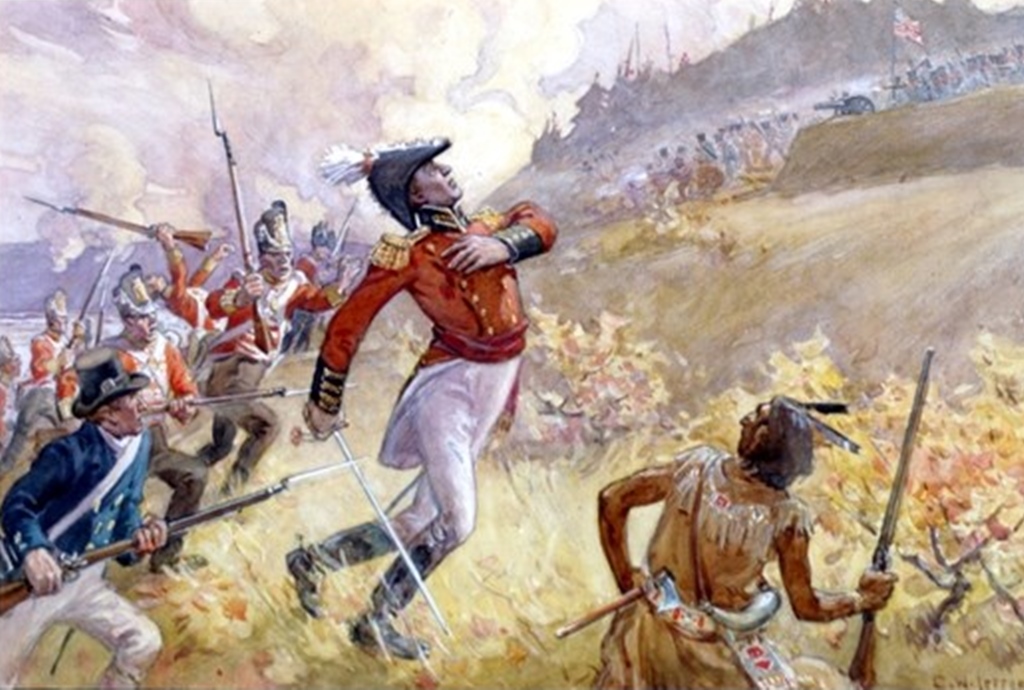
The signal guns at Fort George, several miles away, cracked the silence. Within moments, dispatch riders were galloping along muddy tracks, breathless, summoning reinforcements. At their head was the commander of all British forces in Upper Canada, Major-General Sir Isaac Brock, who responded with characteristic speed and steel.
Brock, who had just returned to Fort George from inspecting distant defenses, did not hesitate. He did not convene a council. He did not wait for precise reports. He did what he always did: he acted.
He mounted his horse, buttoned up his scarlet officer’s coat, and set off at full gallop toward the Heights. He wore no body armor, no disguise, no hesitation. His aides pleaded with him to stay behind the lines — to coordinate the defense from a safe distance. He was, after all, the commander-in-chief, not a front-line captain. But Brock, true to the Roman ideal he admired in Caesar and Plutarch, believed leadership was earned not behind maps, but under fire.
“I shall not ask my men to go where I will not,” he reportedly said.
To the soldiers who watched him pass, spurred and upright in the saddle, he looked more symbol than man — a flash of red against the copper trees, galloping toward the roar of muskets like an officer from a painting rather than from a garrison.
But that red coat, so noble in ceremony, was a beacon in battle.
As Brock approached the heights, he found the battlefield in chaos. The American troops had entrenched themselves along the ridge, establishing a temporary stronghold with a commanding view of the river. A contingent of British regulars and Canadian militia, under heavy fire, were struggling to retake ground. Brock, refusing to let confusion become inertia, dismounted, drew his sword, and prepared to lead a counter-charge uphill.
He rallied the York Volunteers, shouting for them to form ranks. Though the ridge was steep and exposed, Brock understood the stakes: lose the heights, lose the frontier. There would be no second line of defense. He raised his sword high — a gesture of both command and defiance — and advanced.
It was then, midway through the ascent, that fate found him.
A musket ball, likely fired by a New York rifleman concealed among the trees, struck him just below the collarbone, tearing through his chest. Witnesses say he staggered, dropped his sword, and collapsed almost without a sound. Blood soaked his coat, already scarlet, and pooled beneath him in the autumn leaves.
Some say his last words were:
“Push on, brave York Volunteers.”
Others claimed he died instantly. Still others believe he tried to rise before darkness took him. What is certain is this: Brock fell facing the enemy, sword drawn, leading men into battle. He died as he lived — in motion, with purpose, and without fear.
The sight of his body, broken and silent on the hillside, sent a wave of fury through the ranks.
The Mohawk warriors, many of whom had come to regard Brock with deep respect — not simply as a general, but as a man who treated them as allies rather than pawns — were enraged. They let out piercing war cries that echoed through the escarpment like thunder. British reinforcements, including troops under Major-General Roger Sheaffe, soon arrived and executed a flanking maneuver that caught the Americans off guard. In a series of brutal counterassaults, the defenders surged uphill with renewed ferocity.
By afternoon, the American forces were in full retreat, scrambling to escape across the river. Some boats were overloaded and capsized. Many soldiers were captured; others drowned. By evening, the battlefield was eerily quiet again — except for the mourners.
Queenston had been saved.
But Canada had lost its lion.

News of Brock’s death spread through Upper Canada with the velocity of wildfire. Soldiers wept openly. Civilians who had never seen a battlefield felt the blow as if they had lost a father. Flags were lowered. Church bells rang. Minute guns thundered in mourning from Fort George. In villages and townships, men gathered in silence, their heads bowed not just in sorrow, but in a shared realization: their greatest defender was gone.
But in death, Brock gave the fledgling colony something it had not yet possessed: a martyr. A figure around which loyalty could crystallize. A man whose sacrifice could not be measured merely in territory or tactics, but in what he inspired.
As Pierre Berton later wrote:
“His fall became the catalyst for unity. In death, Brock did what no proclamation or policy could — he made Upper Canada a cause worth dying for.”1
They buried him first at Fort George, and later interred him beneath the monument that still towers over Queenston Heights. It was built not only of stone, but of memory, defiance, and gratitude — a reminder that nations are not always forged in victory, but in the moment when a man stands alone, and chooses to lead anyway.
After Brock
In the days and weeks that followed the fall of Major-General Sir Isaac Brock at Queenston Heights, the immediate war did not end. The guns along the Niagara frontier did not fall silent, and the threat of American invasion remained as real as the blood still drying in the grass. More battles lay ahead—Lundy’s Lane, Crysler’s Farm, Châteauguay—each fierce and pivotal, each further proof that the War of 1812 would be no gentleman’s war, no quick resolution. It would be, instead, a long grind of attrition, strategy, and endurance.
And yet, in a very real sense, the psychological high ground of the war had already been taken — not through the movement of troops or the drawing of new borders, but through the martyrdom of one man.
The death of Brock did what no treaty or dispatch from London could have done. It galvanized a colony that, until that moment, was still unsure of itself — still questioning whether it was a land to be defended, or a possession to be negotiated. His fall, though tragic, became the emotional pivot upon which a scattered population began to cohere.
Across Upper Canada, from the shores of Lake Erie to the timber communities in the Eastern Townships, settlers who had previously lived as neighbors under loose British protection now began to speak of one another not simply as colonists, but as compatriots. They had lost a leader — but in that loss, they had gained a cause.
“His fall became the catalyst for unity,” wrote Pierre Berton with characteristic eloquence. “It gave the colony what it lacked — a reason to believe in itself.”1
That belief did not form overnight. It came in the quiet acts of defiance and solidarity that marked the Canadian response in the aftermath: militiamen drilling in winter fields, communities raising funds for defense, Indigenous nations remaining steadfast in their alliances, despite the absence of the one commander who had honored their sovereignty with respect and purpose. In every household where Brock’s name was spoken — often in reverent tones, as if invoking a patron saint of vigilance — the war became not merely a fight for territory, but a defense of identity.
And from that identity, a national narrative began to take shape.
What Canada lacked in 1812 — a flag, a capital, a unifying myth — Brock’s death helped provide. He became not just a fallen general, but a touchstone of sacrifice, a symbol of principled resistance, and, perhaps most importantly, a figure who could be universally admired across linguistic, ethnic, and regional lines. French Canadians, Indigenous warriors, Loyalist farmers, and British-born officers alike could see something of themselves in his story: duty, honor, loss — and the belief that this land, this tenuous colony, was worth preserving.
In the decades that followed, the memory of Brock did not fade — it hardened into myth.
By the mid-19th century, his name had been etched into the very geography of the country. Towns, streets, county districts, and eventually a university bore his name. The monument at Queenston Heights, completed in 1856 after an earlier structure was damaged by explosives, stood over 56 meters tall — a stone obelisk that pierced the sky, as if in defiance of the forces that had once tried to cross the river below. The image of Brock — sword drawn, coat flared, eyes fixed on a rising slope — became a canonical icon in Canadian schoolbooks, war memorials, and patriotic posters.
And more than any other military figure of his time, Brock became a teacher’s story, a civic parable passed from classroom to classroom: a man who died for a country not yet born, and whose sacrifice gave that future country its first authentic military mythology.
“He is not taught merely as a tactician,” writes historian Carl Benn, “but as a founder — a man whose instincts, preparation, and ultimate sacrifice showed the earliest stirrings of what would become Canadian nationhood.”2
Today, more than two centuries after his death, Sir Isaac Brock remains entombed in stone, in song, in textbooks, and in memory. His name lives on in Brock University, in Sir Isaac Brock Bridge, in dozens of schools and streets, and in the hearts of those who still visit the Heights and pause beneath his monument, where wind moves through the pines and cannon muzzles still face the river — silent now, but watchful.
He never held a Canadian passport.
He never served under a Canadian flag.
And yet he remains, for many, Canada’s first great leader.
His death did not end a war.
But it began a story — one that still shapes how Canadians remember courage, identity, and the price of sovereignty.
Conclusion: The Rock Called Brock
History is not kind to hesitation. It rarely pauses to commend those who chose caution over conviction. Instead, it reserves its deepest reverence for those few who, when confronted with chaos, acted not with recklessness, but with purpose. Those who did not wait for clarity, but moved with conviction because they believed the moment demanded it. Sir Isaac Brock was one of those rare men — forged not for ceremony, but for crisis.
He did not survive the war.
He did not live to see victory.
And yet, through the brief, incandescent flare of his leadership, he altered the trajectory of an entire nation.
To speak of Canada’s survival in 1812 is to confront the hard truth that it was never guaranteed. There was no grand strategy, no deep reserves of men or treasure, no professional army strong enough to repel the weight of an American invasion. What there was — in the summer and autumn of that year — was uncertainty, tension, and fear. And one man who, seeing all of it, stood up and decided to act anyway.
“Canada’s survival in 1812 was no foregone conclusion,” writes historian Tim Cook with blunt clarity. “It was held together by a thread. Brock was that thread.”1
A thread — yes — but one stronger than any line of supply. Brock became the stitching that held a fragile patchwork of settlements, loyalties, and cultures together, however briefly, long enough to survive the first great test of their existence. He bound together farmers and fur traders, British officers and French habitant, Indigenous warriors and Loyalist refugees, not through orders, but through example.
He did not ask men to fight — he led them.
He did not speak of duty — he embodied it.
He did not wait for history to unfold — he forced it to turn.
His victories were not just on the battlefield. They were in morale, memory, and myth — the intangible frontlines upon which nations are built. At Detroit, he used fear as a weapon. At Queenston Heights, he used his own life as a standard to rally men in his place. And in death, he left something far rarer than land: he left a story people wanted to carry forward.
And so they did.
They built his monument not as a tomb, but as a promise. Rising from the very ground where he fell, the column at Queenston Heights is not merely stone and sculpture. It is testament. Testament to courage that refuses to wait for orders. To leadership that walks first into danger. To resolve that burns long after the man himself is gone.
It is a lighthouse for memory — one that casts its light not forward, but backward, illuminating a single moment in Canadian history when everything trembled on the brink, and a man stood alone… and because he stood, others found the strength to follow.
Brock was never a Canadian citizen.
He never served a Canadian state.
And yet, no man has ever more clearly earned a place in the pantheon of Canadian identity.
For while nations may be legislated into being, they are lived into existence by the acts of individuals. And in the darkest hour of Canada’s uncertain birth, it was Sir Isaac Brock who gave that idea a pulse, a voice, and a spine.
He died with no anthem to sing him off,
no parliament to eulogize him,
no country to call him its own.
And yet, in the silence that followed, a country began to take shape — around the echo of his actions.
Footnotes & References
- Benn, Carl. The War of 1812. Oxford University Press, 2003.
- Cook, Tim. Warlords: Borden, Mackenzie King and Canada’s World Wars. Penguin, 2012.
- Berton, Pierre. Flames Across the Border: 1813–1814. McClelland & Stewart, 1980.
- Tecumseh quoted in Queenston Heights Manuscripts, Brock University Archives, 2024.
- Brock, Isaac. Private Correspondence to Colonel Baynes, 1812. Upper Canada Archives.
1. Carl Benn – The War of 1812
- Publisher: Oxford University Press, 2002
- Why It Matters: A foundational academic overview. Benn devotes significant analysis to Brock’s leadership, military decisions, and legacy.
- Quote: “Brock’s contribution must be judged not by longevity but by decisive early action.”
- Available via Oxford University Press
2. Pierre Berton – Flames Across the Border: 1813–1814
- Publisher: McClelland & Stewart, 1981
- Why It Matters: The second volume in Berton’s War of 1812 series. While focused on the later stages, it reflects powerfully on Brock’s death and symbolic role.
- Quote: “His fall became the catalyst for unity… it gave Canada what it lacked: a reason to believe in itself.”
3. Pierre Berton – The Invasion of Canada: 1812–1813
- Publisher: McClelland & Stewart, 1980
- Why It Matters: The definitive popular narrative of the War of 1812. Berton paints a vivid portrait of Brock’s early victories and ultimate sacrifice.
4. Tim Cook – Warlords: Borden, Mackenzie King, and Canada’s World Wars
- Publisher: Penguin Canada, 2012
- Why It Matters: While focused on WWI and WWII, Cook draws parallels with earlier Canadian military leadership — including Brock.
- Quote: “Canada’s survival in 1812 was no foregone conclusion… Brock was that thread.”
5. Robert Malcomson – A Very Brilliant Affair: The Battle of Queenston Heights
- Publisher: Robin Brass Studio, 2003
- Why It Matters: The most detailed tactical analysis of Queenston Heights — where Brock fell. Rich in archival material and battlefield accounts.
6. E. Williams – Isaac Brock Commemorative Coin Project (Brock University Archives)
- Why It Matters: A unique archival project detailing public commemoration of Brock’s memory and image.
- View here
7. John E. Wool – Manuscripts on the Battle of Queenston Heights
- Drafts housed at Brock University’s Archives
- Why It Matters: First-hand reflections and narrative reconstructions by a contemporary U.S. officer who fought at Queenston.
- Second Draft
- Third Draft
8. Ernest Cruikshank – The Life of Sir Isaac Brock
- Originally published: 1900s, various editions
- Why It Matters: A classic biography drawing heavily from Brock’s personal correspondence. A bit dated in tone but historically important.
9. J. Mackay Hitsman – The Incredible War of 1812: A Military History
- Publisher: University of Toronto Press, 1965
- Why It Matters: Military-focused study with sharp insights into Brock’s command and the broader conflict.
- Quote: “Brock at Detroit delivered a blow whose echo reached Washington before the cannon smoke had cleared.”
10. Donald E. Graves – Field of Glory: The Battle of Crysler’s Farm
- Publisher: Robin Brass Studio, 1999
- Why It Matters: Though Brock had died by this battle, Graves analyzes how his earlier actions shaped defensive strategy in Upper Canada.


